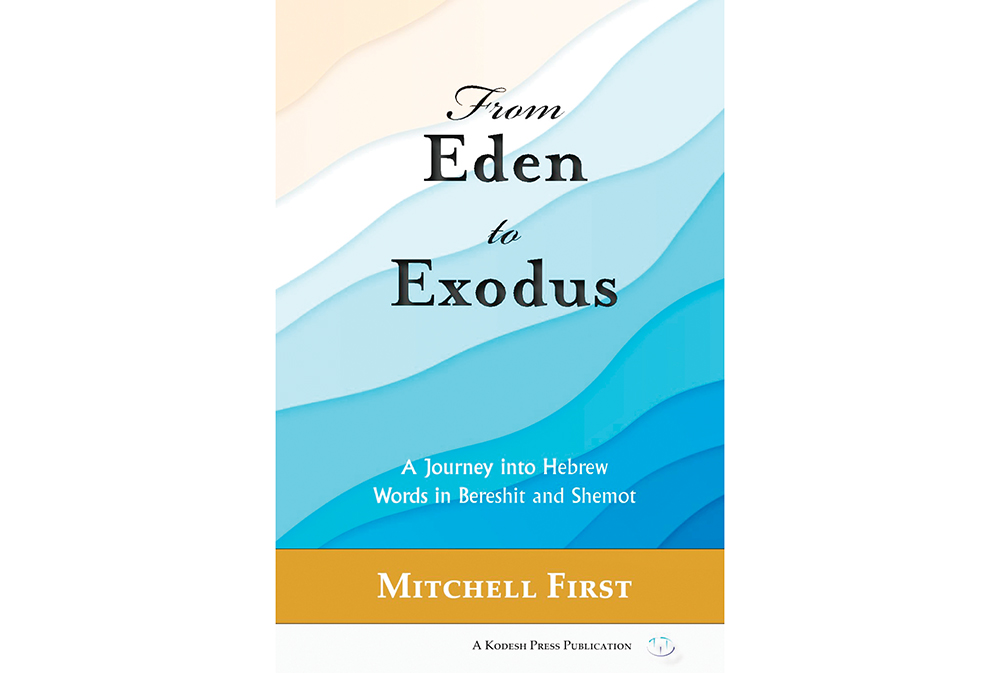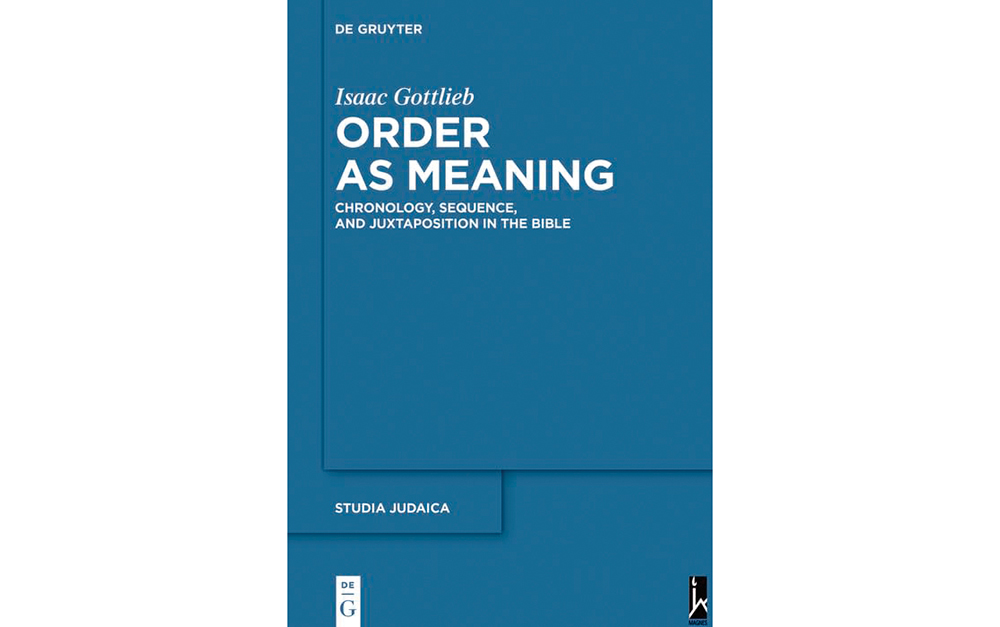
Reviewing: “From Eden to Exodus: A Journey into Hebrew Words in Bereshit and Shemot” by Mitchell First. Kodesh Press. 2024. English. Paperback. 203 pages. ISBN-13: 979-8888940280.
Mitchell First, a New York City injury attorney with a strong background in Jewish scholarship and a weekly contributor to The Jewish Link, began his career as an author by focusing on Jewish history. However, his more recent books reflect his growing interest in Hebrew etymology. “From Eden to Exodus” is his sixth book, and it continues his exploration of the Hebrew language through a unique lens.
This book offers two or three essays on each Torah portion in the books of Genesis and Exodus, each essay standing alone and focused on a particular Hebrew term in the relevant portion. First examines the semantic range of each word, exploring cognates and related terms to attempt to uncover the original meanings and source languages of these key words. He deftly uses traditional rabbinic sources, including the Midrash, Talmud and Targumim, along with medieval commentators and exegetes, to ground his insights in established scholarship.
Notably, First also brings modern scholarship into the discussion, referencing invaluable resources like the Brown-Driver-Briggs (BDB) dictionary, Menachem Zvi Kaddari’s “A Dictionary of Biblical Hebrew,” and Mossad HaRav Kook’s “Da’at Mikra” series (which blends traditional and academic approaches). Like anybody serious about Hebrew etymology, First also draws on Rabbi Ernest Klein’s etymological dictionary of Hebrew, reflecting his appreciation for a wide range of perspectives on language. Special mention goes to the author’s affinity for Solomon Mandelkern’s “Biblical Concordance,” a key tool for his in-depth linguistic investigations.
One of the most engaging aspects of First’s writing is his willingness to share his opinions on different interpretations, openly stating which explanations resonate with him and which he finds less compelling. His conversational tone and sense of humor make this a surprisingly light read for a subject as profound as Hebrew etymology. As a regular reader of First’s weekly articles in The Jewish Link (many of which are republished in this volume), this reviewer is already familiar with his characteristic style that balances depth with accessibility. This book is a valuable addition for anyone interested in exploring the nuanced meanings of Hebrew words in the Torah, as well as for students of Jewish history and language.

Reviewing: “Order as Meaning: Chronology, Sequence, and Juxtaposition in the Bible” by Isaac Gottlieb. De Gruyter; 1st edition. 2023. Hardcover. 211 pages. ISBN-13: 978-3110584509.
In this book, Dr. Isaac Gottlieb (professor emeritus at the Zalman Shamir Department of Bible in Bar Ilan University) delves into the importance of order, sequence and placement in the structure of the Bible. His analysis recognizes such ordering on multiple levels—from the broad juxtaposition of entire books (macro-level) to the positioning of individual verses (micro-level). In doing so, the author examines the arrangement of many specific passages and ideas, which may reveal layers of meaning and intention beyond the surface narrative.
One chapter addresses the perspectives of the Talmudic sages and Midrashic literature, exploring how the rabbis of antiquity justified seemingly unrelated or abrupt juxtapositions within the biblical text. In this context, Gottlieb underscores the Midrashic tendency to add extra scenes or details as interpretive tools, aiming to bridge textual gaps and clarify relationships between adjacent, but otherwise seemingly disconnected, events.
The book then shifts to the medieval commentators, dedicating individual chapters to Rashi, Ibn Ezra and Nachmanides. Gottlieb discusses each commentator’s approach to sequence and order, revealing unique perspectives on whether and how to consider chronological or thematic unity in biblical interpretation. Ibn Ezra’s stance, for instance, is particularly nuanced: While he holds that individual commands may maintain thematic independence, he also posits that they should ultimately align with an overarching unity of the relevant pericope. Notably, Ibn Ezra’s views are often shaped by his polemics against Karaite exegetes, who favored a more literal interpretation and strict adherence to chronological sequence as part and parcel of their rejection of rabbinic Judaism. Gottlieb includes an appendix by Daniel Frank, which delves deeper into Karaite approaches to narrative sequence.
A chapter dedicated to modern scholarship discusses the methodologies of Shadal (Samuel David Luzzatto) and Umberto Cassuto, both of whom brought new, systematic approaches to the topic. That chapter also explores the approaches taken by various contemporary Bible scholars like Alexander Rofé, Robert Alter and Yair Zakovitch. Gottlieb explores the tension between modern and classical interpretations of sequence, especially as they pertain to the question of whether the Torah should be read as a chronological document or if certain passages are arranged nonsequentially for thematic or pedagogical reasons.
The issue of ein mukdam u’muchar ba’torah (“there is no ‘before’ and ’after’ in the Torah”) is examined in depth, with Gottlieb analyzing the conditions under which different commentators may accept this principle. A recurring question Gottlieb addresses is the exact definition of what constitutes pshat (“plain meaning”) and in what ways Midrashim can be compatible with a literal or literary interpretation. He explores differences in approach between Rashi and his grandson Rashbam, particularly on whether contextual and literal readings should take precedence over homiletic/exegetical interpretations.
Overall, “Order as Meaning” is a rigorous, thoughtful work that engages deeply with foundational questions in biblical interpretation. Gottlieb’s systematic and serious analysis makes it a valuable resource for readers interested in the complexities of biblical sequence and structure, as well as the interpretive philosophies that have influenced Jewish exegesis through the ages.
Rabbi Reuven Chaim Klein is a distinguished author and scholar originally from Valley Village, California. He holds rabbinic ordination from prominent figures and is a member of the RCA. He is known for his popular books, scholarly essays, and involvement in Torah-related projects. He holds an MA in Jewish education from the London School of Jewish Studies, and currently resides in Beitar Illit.








